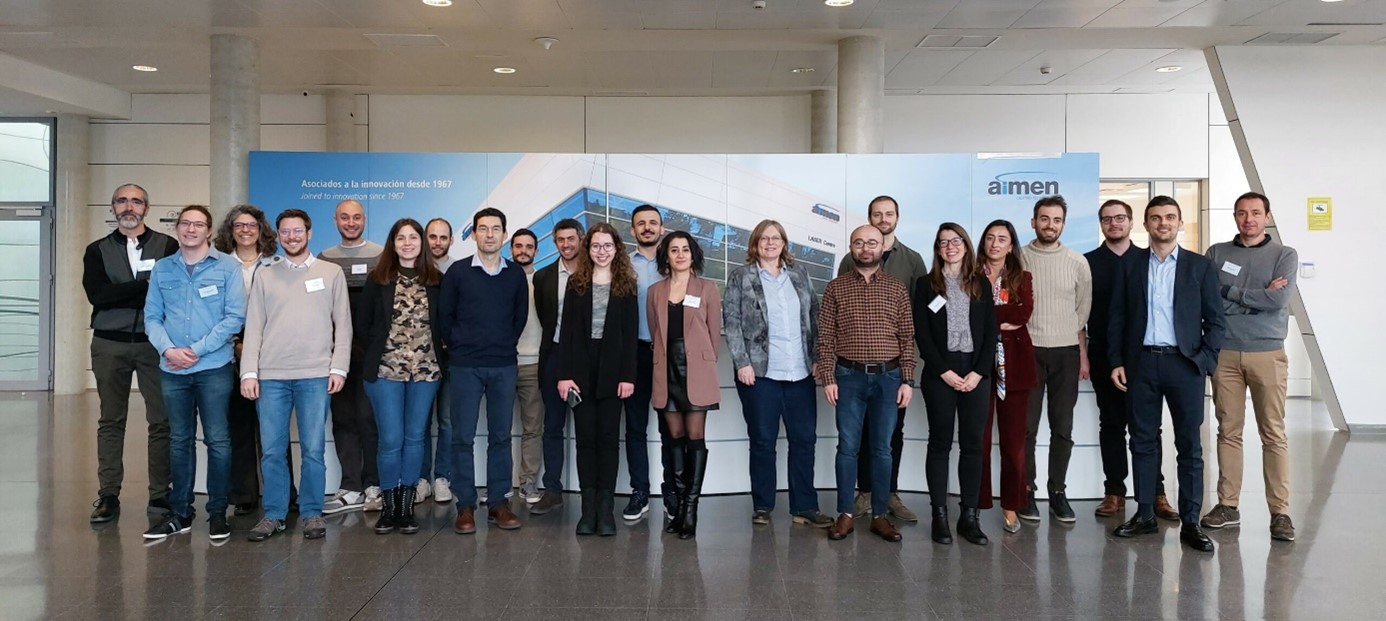In February 2023, the second year Meeting of the LEVIS project took place at project partner AIMEN in O Porriño, Pontevedra, Spain. The two-day session allowed the LEVIS consortium to exchange in detail on the project’s progress and to define the way forward for the last year of the project.
All partners participated in the 2-year meeting to present the work carried out over the last months. A special focus was put on the status review of each of the LEVIS demonstrators. In the project, a lightweight suspension control arm (Demo 1), cross car beam (Demo 2) and battery holding set (Demo 3) are developed using eco-design and circular economy approaches.
The status review covered various aspects of the demonstrator development, including the demonstrator’s design and validation, material selection, manufacturing processes, modelling and structural health monitoring as well as end-of-life approaches. This review was accompanied by a detailed assessment of the work carried out in the different project work packages, including, among others, the evaluation of the environmental and techno-economic impacts of the LEVIS developments.
Results achieved after two years of LEVIS
The LEVIS project has shown considerable progress since its start in early 2021. Guidelines for the demonstrators for the entire development process have been established, including requisites that the components must fulfil in real life. To integrate eco-design and circular economy principles from the very beginning of the design process, an Eco-Design toolkit (integrated Eco-Design Guideline and Evaluation, iEDGE) was developed and used by the electric vehicle (EV) component manufacturers.
A material card able to reproduce experimental results carried out at coupon level on new materials has been defined and integrated into virtual analysis to assess how the new materials impact product performances. A new design for each LEVIS demonstrator has been drafted and the first loop of virtual analysis validation has been carried out successfully. For life monitoring and predictive failure detection of the demonstrator components, a range of sensors has been manufactured. In addition, strategies for parts harvesting, repair, reuse and recovery are currently defined to make sure that after the components’ end-of-life, nothing will become waste and every part can be recycled or reused for the same or other applications.
“After 2 years of LEVIS, we have achieved excellent results that will bring us closer to making lightweight and affordable components for electric vehicles a reality. Based on the progress made in the development of innovative materials and the demonstrator design, weight reductions at vehicle and component level are estimated to range between 23-28%, which is well in line with the ambitious objectives we have set for the LEVIS project.”
– Agustín Chiminelli, LEVIS technical project coordinator from ITAINNOVA (Instituto Tecnológico de Aragón), Spain
Future plans
The LEVIS prototypes will undergo experimental tests during 2023. Parameters for the demonstrators’ fabrication have already been tested, improved and validated. As the first part of the full Life Cycle Assessment (LCA) of the LEVIS demonstrators, the preliminary results for benchmark products, representing the conventional use of materials and processes, have been obtained. This will allow the project to assess the improvement and overall impact that will be realised through the demonstrators developed using new materials and processes. Other focus topics for the third project year will be to demonstrate the impact of replication of the LEVIS solutions to other EV components and maximise the demonstrators’ exploitation potential.
For further information contact:
José Ramón Valdés
Project Coordinator
+34 976 011 160 / +34 692041461
jrvaldes@itainnova.es
